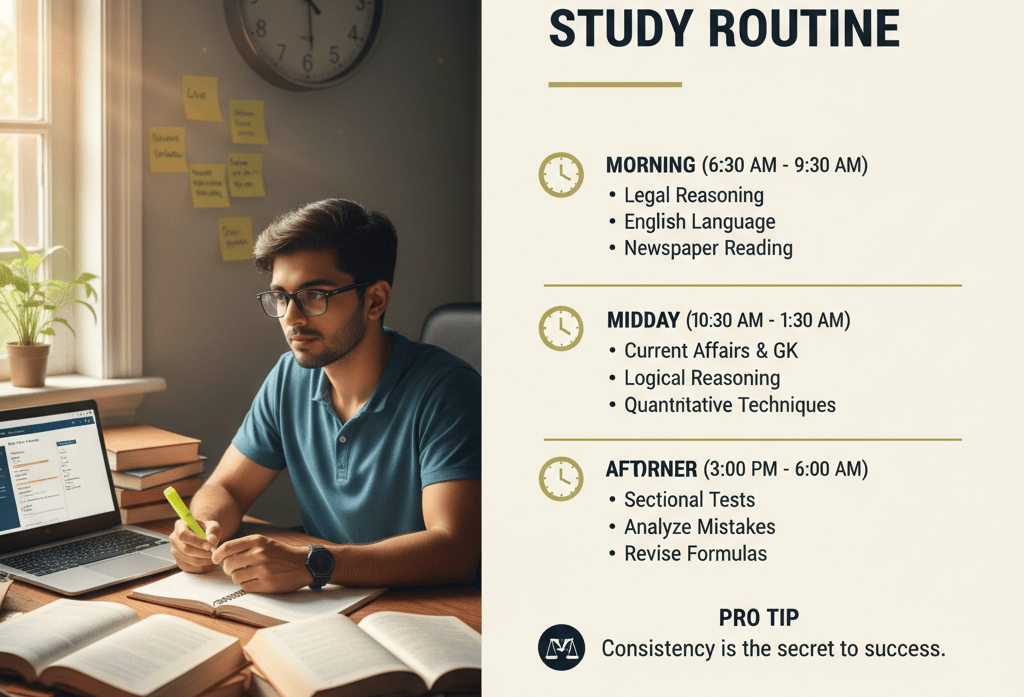CLAT Daily Study Routine: Smart Schedule for Top Results
Ace CLAT with a structured daily routine! Discover a smart study schedule balancing Legal, English, GK, Reasoning & Quant, plus expert tips for consistency and success.
LAW ENTRANCE
9/21/20253 min read


A DAY IN THE LIFE: A SAMPLE DAILY STUDY ROUTINE FOR CLAT ASPIRANTS
Preparing for the Common Law Admission Test (CLAT) is not just about hard work, but also about smart planning and consistent practice. With thousands of aspirants competing for limited seats in the top National Law Universities (NLUs), it’s important to have a structured study plan. Many students ask: “What should my daily routine look like for CLAT preparation?” This article breaks down a practical sample daily study routine that balances preparation, revision, practice tests, and relaxation.
Why a Daily Routine Matters in CLAT Preparation
Consistency is the secret to success in CLAT. Unlike board exams that test memory, CLAT checks speed, accuracy, and analytical ability. A daily schedule helps you:
Cover all five sections of CLAT: English, Current Affairs including GK, Legal Reasoning, Logical Reasoning, and Quantitative Techniques.
Build the habit of regular reading, which is crucial for long comprehension passages.
Practice time management—CLAT is a speed-based exam.
Avoid burnout by balancing study and relaxation.
Morning: The Power Hours (6:30 AM – 9:30 AM)
Research shows that your brain is most active in the morning. Use these hours for subjects requiring concentration and fresh memory.
6:30 – 7:00 AM: Light exercise or meditation to boost focus.
7:00 – 8:15 AM: Work on Legal Reasoning passages—practice reading comprehension with a legal twist.
8:15 – 8:30 AM: Take a short break.
8:30 – 9:30 AM: Study English Language—reading comprehension, vocabulary, and grammar-based practice.
Tip: Read newspapers like The Hindu or Indian Express in the morning. They not only improve comprehension skills but also build your GK base.
Midday: Building Core Knowledge (10:30 AM – 1:30 PM)
This session is about deep learning and conceptual understanding.
10:30 – 11:30 AM: Focus on Current Affairs and GK. Read monthly current affairs magazines, revise important events, and practice quizzes.
11:30 – 12:30 PM: Solve Logical Reasoning puzzles and passage-based questions.
12:30 – 1:30 PM: Work on Quantitative Techniques—focus on data interpretation, percentages, and ratios.
Tip: Maintain a GK notebook for quick daily revisions.
Afternoon: Practice & Application (3:00 PM – 6:00 PM)
This is the time to apply what you’ve studied.
3:00 – 4:30 PM: Take a sectional test (e.g., only English or Legal Reasoning) and analyze mistakes.
4:30 – 5:00 PM: Relax with a light snack.
5:00 – 6:00 PM: Revise formulas, important legal principles, or vocabulary flashcards.
Tip: Never skip analysis of mock tests. Identifying errors is more important than just attempting questions.
Evening: Revision & Light Reading (7:00 PM – 9:00 PM)
Evening sessions should be less intensive but consistent.
7:00 – 8:00 PM: Revise the day’s topics and highlight difficult questions for reattempt later.
8:00 – 8:30 PM: Read editorials or legal blogs to build critical thinking.
8:30 – 9:00 PM: Light revision of GK or Legal maxims.
Tip: Maintain a weekly revision chart to ensure no topic is missed.
Night: Wind Down & Self-Assessment (9:30 PM – 10:30 PM)
Before sleeping, spend some quiet time with reflective learning.
9:30 – 10:00 PM: Revise 10–15 GK facts or practice 5 quick logical puzzles.
10:00 – 10:30 PM: Write a short self-assessment—what you did well and what to improve tomorrow.
This self-tracking habit builds discipline and reduces last-minute stress.
Weekly Routine Add-ons
Mock Tests: At least 2–3 full-length CLAT mock tests every week.
Group Discussions: Weekly sessions with peers to discuss current affairs.
Rest & Recreation: Keep one evening free for hobbies to avoid burnout.
Pro Tips from Experts
Stick to the Pomodoro Technique: Study 25 minutes, break for 5 minutes. It keeps the mind fresh.
Keep Sundays for revision and mocks.
Focus on quality, not quantity—better to do 50 questions with full analysis than 200 with no review.
Use online resources and question banks to stay updated with new question patterns.
Conclusion
A well-planned daily routine ensures that you don’t just study hard but also study smart. The key to cracking CLAT lies in discipline, consistent practice, and periodic self-evaluation. Remember, every topper once followed a strict timetable that balanced learning, testing, and rest.
At ResultPrep Coaching, we help aspirants create personalized study plans, offer expert strategies, and provide full-length mocks to replicate the real CLAT exam environment. With our guidance, your dream NLU is within reach!
Prepare for the best results!
Achieve your goals with expert coaching and support from ResultPrep.
Contact us:
© 2025. All rights reserved.
Address:
GSS Complex, 2nd Floor,
16th Cross Rd, HMT Layout, Vidyaranyapura, Bengaluru, Karnataka- 560097
